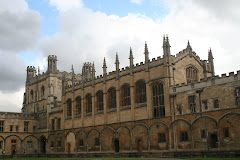This has been a week of reading in the area of pastoral leadership. Each book reads like the one before it. Perhaps, per King Solomon, there is nothing new under the sun after all.
The Christian faith is ancient. Its foundational texts are equally ancient. The faith's collected wisdom, honed and sharpened by each succeeding generation, sounds familiar because it is familiar. The issue is not not knowing. We know too well. It is the doing. That said, here are some thoughts on N. Graham Standish's book Becoming a Blessed Church: Forming a Church of Spiritual Purpose, Presence, and Power.
Standish is the pastor of Calvin Presbyterian Church in Zelienople, PA. His area of expertise is pastoral leadership and spiritual formation. His book on first read is a Rick Warren purpose driven "me too tome." I had to set the book aside for a day and ask again what his point was and how it differed from Warren's work.
Standish's book is filled with "this is what we did at Calvin Church and it was a huge success" type stories. His preacher training leads him to over illustrate each of his points. Many of his points, however, are worth noting.
Standish's main point is this: Studying and speculating about God has its place, but it is insufficient; encountering and experiencing God is essential.
Standish surveys the literature on why some churches are thriving while others are on life support. Too many well-meaning and best-intentioned analysts find their answers in theology. Not so with Standish. He writes: "When it comes to theological positions, I've noticed that there are many growing conservative and liberal churches, just as there are many declining conservative and liberal churches . . . . What I have consistently noticed in almost all thriving congregations is that what makes a difference is the extent to which the community is open to God at its core." The breadth and length of Standish's book is an exploration of what a community that is open to God looks like. He uses the word blessed to describe it.
Standish makes a series of simple statements as to what a blessed church is:
The blessed church:
1. Sees itself as the body of Christ.
2. Has a vibrant sense of faith, hope, and love.
3. Is filled with God's purpose, presence, and power.
4. Embraces the sacred.
5. Is not afraid to serve God in its own way.
To be expected, leadership, both clerical and lay, plays a key role in a church becoming "blessed." Good leaders, according to Standish, ask first, last and always, "God, what is your call for us?" and then point and motivate people to go where God is going, not necessarily where the people want to go. In Standish's words, "The best leaders encourage people to want what God wants."
A lot of books on leadership paint only the rosiest of pictures. Standish notes that sometimes, even with the best of leadership, things go awry. No one, of course, fails on purpose, especially in church life. People are motivated to give God and their fellow believers nothing but the best they can offer. And still, failure can and does ensue. Sometimes it's a matter of not knowing how to do something or trying to do too much or losing sight of the goal or lacking confidence. Good leadership owns failures and sees them as a window on a new opportunity and never as a measure of the value and importance of the persons involved. There is a word for this, it's compassion. Jesus did not give up on Peter nor should we give up on one another.
That's it for the moment. Peace.
Thursday, September 6, 2007
Subscribe to:
Post Comments (Atom)
Links worth visiting
- Dan Kimball's website -- Dan is author of The Emerging Church and pastor of Vintage Church, Santa Cruz, CA
- Calvin Church, Zelienople, PA
- Calvin Institue of Christian Worship
- William and Mary's DOG Street Journal
- Brian McLaren's hompage -- author, speaker, activist
- Isabella Stewart Gardner Museum, Boston, MA
- JFK Presidential Library and Museum, Boston, MA
- My writing instructor at Oxford's Summer School
- Homepage for Oxford University's Oxford Experience
- Simon Fraser University Pipe Band
- One of the guitarists with whom I studied in Maryville
- For the bluegrass music fan with details about the bluegrass guitar camp I will be attending
- Montreat: The starting point for hiking western NC's Blue Ridge wilderness
- For citizens of Red Sox Nation
- My home and place of study while in Glasgow, Scotland, UK
- Here's the site of the bluegrass guitar camp in the TN Smokies
- Take a virtual tour of Cooperstown's Baseball Hall of Fame
- Barnwell Inn: My B&B home away from home in Cooperstown, NY
- First Presbyterian Church, Winchester, VA, USA





















1 comment:
Thanks Dan. We are enjoying reading your thoughts.
Karen & Dennis Kellison
Post a Comment